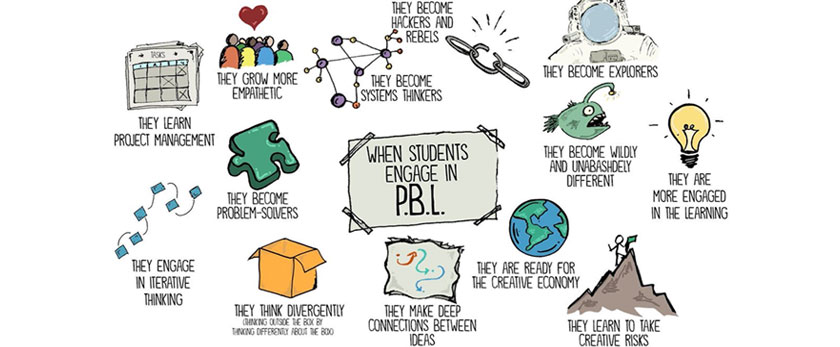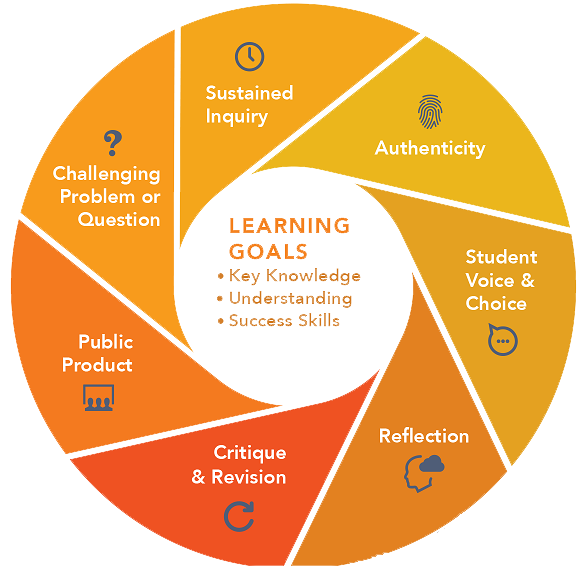Experiential Learning (ExL) – Project Based Learning
“Project-based learning can nurture student autonomy by requiring students to make authentic decisions about what they learn and do.”
Preamble:
Engineering education provides a platform for acquiring knowledge and skills in their respective domains of engineering. Project based learning guarantees learning opportunity to the undergraduate students through integration of basic knowledge and conceptual aspects with hands on training and practice in a real life work environment. The Four C’s of 21st Century Learning i.e Critical Thinking, Communication, Collaboration, and Creativity are integrated into project based learning to prepare the students for providing the solutions to the real-time problems in the society. The major focus of the course is to apply the knowledge of mathematics, basic science and engineering principles for modeling and simulation using modern tools.
Introduction:
Project-based learning (PBL) is collaborative, learner-centered instructional approach where students work in groups to construct their knowledge using modern tools. It often requires students to collaborate, design, revise, and share their ideas and experiences with authentic audiences and supportive peer groups rather than collect resources, organize work, and manage long-term activities. Project-Based Learning begins with the assignment of tasks that will lead to the problem identification, modeling, simulation and analyzing the results.
Course Objectives:
- To emphasize learning activities that is long-term, interdisciplinary and student-centric.
- To inculcate independent learning by problem solving with social context.
- To engages students in rich and authentic learning experiences.
- To provide every student the opportunity to get involved either individually or as a group so as to develop team skills and learn professionalism.
Course Outcomes:
- Students develop an ability to function on multidisciplinary teams.
- Students develop an understanding of professional and ethical responsibility.
- Students develop an ability to communicate effectively.
- Students explore to the modern tools for solving the identified problems.
- Students comprehend the impact of engineering solutions in a global, economic, environmental, and societal context.
- Students develop recognition of the need for, and an ability to engage in life-long learning.
Mapping of CO and PO:
|
Course Outcomes |
Program Outcomes |
| CO1 |
Students develop an ability to function on multidisciplinary teams |
PO9, PO10, PO11 |
| CO2 |
Students develop an understanding of professional and ethical responsibility |
PO6, PO7, PO8 |
| CO3 |
Students develop an ability to communicate effectively. |
PO10 |
| CO4 |
Students explore to the modern tools for solving the identified problems |
PO3, PO4, PO5 |
| CO5 |
Students comprehend the impact of engineering solutions in a global, economic, environmental, and societal context |
PO3, PO4, PO5, PO6, PO7 |
| CO6 |
Students develop a recognition of the need for, and an ability to engage in life-long learning |
PO12 |
Evaluation and Continuous Assessment:
The course content includes development of tool based project that the students work on during the semester to demonstrate identified problem. Students work on the projects in teams with two to four students per team, and teams may form in interdisciplinary nature. The deliverables for the projects include submission of reports on weekly basis, a proof of- concept and a functional alpha prototype using any tools. The students also present their work at the end of the semester to show case the project and demonstrate during the project expo. Written and oral communication components are intertwined with the project deliverables through required project reports and oral project presentations.
The course is worth one credit hour with the contact time hundred minute session per week. All the sessions in every week is used for project activities, team meetings and prototype. It is recommended that the all activities are to be record on regular basis and proper documents are to be maintained by students and faculty mentor.
Recommended parameters for assessment, evaluation and weightage:
| S.No |
Parameter |
Weightage |
| 1 |
Idea generation |
5% |
| 2 |
Outcomes of PBL/ Problem Solving Skills/ Solution provided/ Final model (Individual assessment and team assessment) |
50% |
| 3 |
Documentation (Gathering requirements, design & modeling, implementation/execution, use of technology and final report, other documents) |
25% |
| 4 |
Demonstration (Presentation, User Interface, Usability etc) |
10% |
| 5 |
Contest Participation/ publication |
5% |
| 6 |
Awareness /Consideration of -Environment/ Social /Ethics/ Safety measures/Legal aspects |
5% |
Process






 Work with Us
Work with Us Campus Map
Campus Map How to Reach Us
How to Reach Us Online Degree Verification
Online Degree Verification Photo Gallery
Photo Gallery